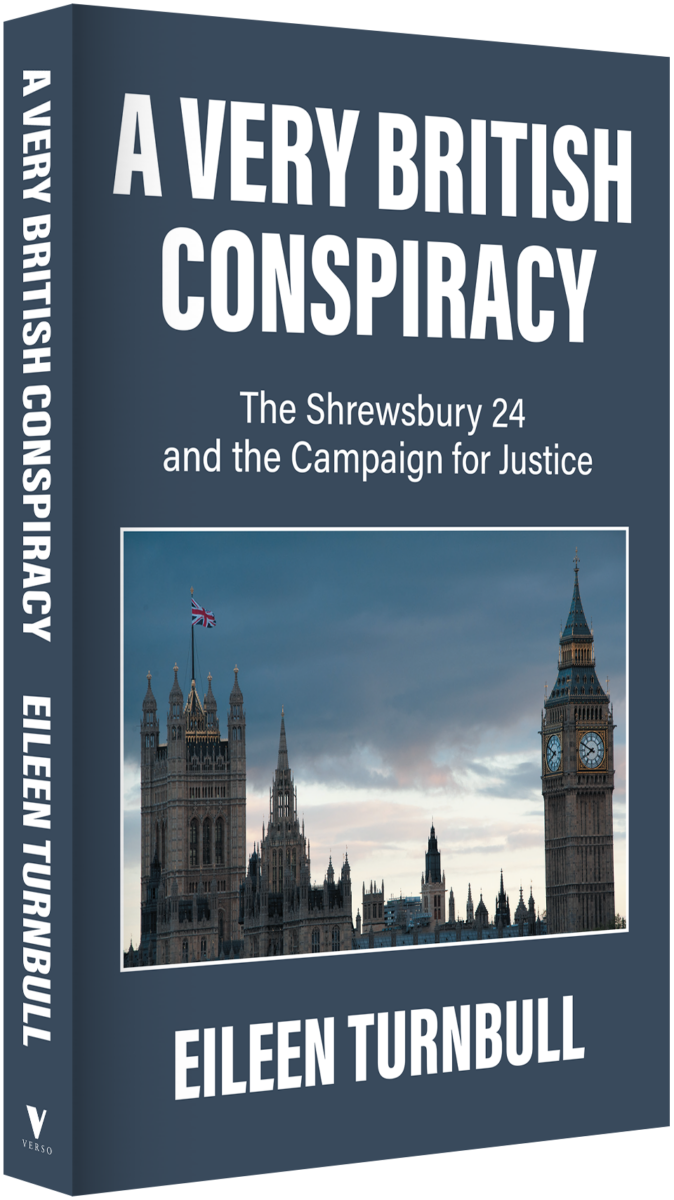There were no reports in the mainstream media in February 2021 of the victory in the Court of Appeal, which annulled the conviction of the Shrewsbury pickets, who were convicted 47 years ago.
Several had been sent to prison, including a two-year sentence for Ricky Tomlinson and three years for Des Warren, the main leader of the pickets. The court did not award any compensation; several of the pickets were blacklisted for life.
This amazing book is about the campaign to clear their names, which started after the death in 2004 of Des Warren. It was started by a couple of the picketers and a small number of supporters, who were soon joined by Eileen Turnbull, who started as the treasurer but then became the researcher.
The book first tells the story of the strike, which was about low wages and terrible conditions, including the “lump,” a form of bogus self-employment analogous to today’s widespread gig economy. It came just after the 1972 Miners’ Strike, with its mass pickets and the strike to release the “Pentonville 5,” dockers imprisoned as a result of Tory anti-union laws. These strikes captured daily headlines, but because the official building workers’ strike did not affect the public, there was less coverage. Despite the fact that they had organised pickets around the construction sites.

The chapters on the strike and then the court cases should be read by anybody who thinks the justice system is independent.
There were only minor arrests during the strike in Wales and the Northwest, and people received fines.
But the building’s employers were not satisfied with this because the strike had been successful and workers had won a substantial wage rise.
There was a campaign in the Tory media for new anti-picketing laws (sound familiar?). So, the employers produced a file on the strike and on the individuals involved. They were demanding action. Sure enough, six months after the strike, the 24 were arrested.
There was a big concentration on Des Warren, even though he could show that the chief police officer at the main picket line for which he was charged had congratulated him on a peaceful picket.
Eileen’s research shows how the state prepared. They first had minor cases in the court in Mold, which they lost, but they saw why and changed their charges for the Shrewsbury cases. They then made sure it took place in Shrewsbury, far from where the pickets lived, and they made sure they had a suitably biased and reactionary judge, which showed throughout the trial. Then the government changed the law regarding jury selection. The defence had rejected building contractors or others in the Mold trial. Now they were not told what trade people were in. The authorities said this was the same for the prosecution, but this was untrue.
Eileen found many cases of government involvement in the trial over a long period, such as secret meetings with the employers.
She also went through government records and found that she was refused documents. Much of the campaign was involved in trying to get these documents, which were not just blocked by the Tories, but by Labour’s Jack Straw too, even though many Labour MPs were demanding their release.
Finally, she found a document amongst police records that showed that original witness statements had been destroyed and replaced by others.
In her determination to get to the bottom of the case, she had completed a university doctorate on the Criminal Convictions Review Commission (CCRC). The CCRC is the only body that can take the case to the Court of Appeal.
Ken Loach, who supported the campaign, had put her in touch with Bindman’s solicitors to present their case to the CCRC, which they did. They focused on the destruction of witness statements. They also dealt with a BBC programme transmitted during the trial that attacked communists in the building industry and quoted the employer’s documents about violence. The campaign lawyers said this was prejudicial to a fair trial.
The CCRC still rejected their case. So they took their case against the CCRC to judicial review. This was presented by Michael Mansfield. The destruction of witness statements was clearly illegal, and the CCRC was forced to retake the case, which it did. The case was then taken to the Court of Appeal, and they won.
All these processes took years. Unsurprisingly, all the papers, like the Daily Mail, that had produced reams of articles before the trial attacking the strikers, did not then report their victory.
Of course, the problem is that the trials had the required effect, and building workers were victimised. The threat of prison hung over them for picketing, and organisations all over the industry were destroyed.
This was not just an important strike and trial in history; its repercussions continue today. This amazing campaign and its documentation have done the labour movement a favour. Leaflets advertising the book have been circulated to Unite union branches. Even UCATT, which deserted the pickets during the trial, is now supporting the campaign. The latest threats from the Tory government to bring in further anti-union laws to try and weaken the public sector strikes make it even more relevant today.
Get a copy of this book and read it; it’s compelling and has a lot more information than I’ve mentioned.
A Very British Conspiracy: The Shrewsbury 24 and the Campaign for Justice by Eileen TurnbulL. Published by Verso Books and can be purchased here.
Art Book Review Books Capitalism China Climate Emergency Conservative Government Conservative Party COVID-19 Creeping Fascism Economics EcoSocialism Elections Europe Event Video Far-Right Fascism Film Film Review France Gaza Global Police State History Imperialism Israel Italy Keir Starmer Labour Party London Long Read Marxism Marxist Theory Migrants NATO Palestine pandemic Protest Russia Solidarity Statement Trade Unionism Trans*Mission Ukraine United States of America War

